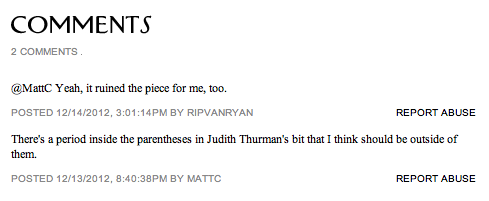A-fucking-men:
Only with gun violence do we respond to repeated tragedies by saying that mourning is acceptable but discussing how to prevent more tragedies is not. But that’s unacceptable. As others have observed, talking about how to stop mass shootings in the aftermath of a string of mass shootings isn’t “too soon.” It’s much too late.
Ezra Klein: Twelve facts about guns and mass shootings in the United States
December 14, 2012

Have you ever spotted an error on the Internet? Chandra at Painting the Grey Area has some helpful advice for people who find mistakes in other people’s writing:
Be nice to people.
Think about where they might be coming from.
Understand that you might not know anything at all about their background.
Realize that you very probably dont know everything there is to know about the English language.
Consider that mistakes are not the end of the world.
Understand that flippant comments by a stranger on the Internet are not going to fix a person’s language skills.
Consider the context, and whether making a correction is appropriate.
If it is appropriate, consider that a polite and reasonable tone is a lot more likely to get you what you want than a douchebaggy rant.
Think about how you respond to sneering criticism. Think about whether other people are likely to respond any differently.
Realize that derailing a discussion to argue about grammar is going to annoy a lot of other readers.
Consider your true intentions.
Consider that other people will read your response, and it will in turn influence how they respond to others.
Consider that you contribute to a culture on the Internet (and everywhere else in your life). It is up to you to decide what you want that culture to look like. Use your voice accordingly.
Literacy Privilege: How I Learned to Check Mine Instead of Making Fun of People’s Grammar on the Internet
December 14, 2012
From a description of a short video history of the animated GIF:
Not only did the GIF pave the way for future digital art memes, but even the savviest of media creators cannot decide whether to pronounce it with a hard or soft g. (Hint: Inventor Steve Whilhite pronounced it like the peanut butter brand).
Think Kathy Lee GIFford.
via Fresh Air
December 12, 2012
Fair question. But it’s hard to get a clear answer when you have lazy reporters who are invested in a particular narrative. Kevin Drum shakes his head at a recent example:
[The] reporter was flatly ignorant of all this, so she simply hauled out standard hysterical template No. 4 and decided that the test results represented “severe shortcomings in the nation’s reading education” even though they show no such thing.
This stuff just never ends. I wish our nation’s reporters were required to take a [National Assessment of Educational Progress] test of their own every year. I think that’s probably the only thing that might motivate them to figure out what these scores actually tell us.
New Test Shows Severe Shortcomings in Nation’s Press Corps
December 10, 2012


